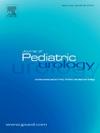在多元文化社会中,46, XY DSD 患者被指定为女性后的长期性别分配结果
IF 1.9
3区 医学
Q2 PEDIATRICS
引用次数: 0
摘要
性发育障碍(DSD)患者的性别抚养决定与多学科团队的共同决策模式密切相关。其中一些患者成年后可能会出现性别焦虑症。我们的目标是评估在本中心接受女性性别鉴定的 XY DSD 患者的长期治疗效果。我们对过去 30 年中在本机构接受女性性别分配的所有 46 XY DSD 患者进行了一项回顾性研究,发现有 25 名 46 XY 患者在出生后被当作女性抚养。在排除雄激素不敏感综合征(AIS)患者后,我们发现有 15 名患者符合研究标准。其中 11 例(74%)由父母决定性别抚养,2 例(13%)在疝修补术/腹股沟探查术中由手术团队决定性别抚养。在 2 个(13%)病例中,患者在青春期了解病理后,选择继续以女性身份自居。15 名患者中有 9 名(60%)(年龄为 17.9 ± 4.7 岁(平均 ± SD))同意回答有关性功能和性别分配满意度的问卷。平均随访时间为 11.1 ± 8.2 年(平均 ± SD)。只有一名参与者同意回答有关性交(同性恋)的问卷。FSFI 总分为 24 分,其中欲望、唤起、润滑、高潮、满意度和疼痛分别为 4、4、3、4、3、2 分。有两名患者对性别分配决定表示后悔。第一位患者患有 5α 还原酶缺乏症,他在成年后自行决定了性别分配;另一位患者(3β-羟基类固醇脱氢酶)在孩童时期的腹股沟探查中接受了性腺切除术。其余患者对性别选择感到满意,2 人需要日常心理支持。与普通人相比,研究组的恋爱和同居时间明显较晚。尽管这个问题很敏感,而且存在文化差异,但大多数患者(78%)对接受女性性别鉴定的决定表示满意。多年来,患者需要进行细致的随访,以便考虑额外的干预措施,并在必要时获得精神支持。这两例后来后悔的病例突出表明,在决定进行性别鉴定时,对患者、其家人和医疗服务提供者进行适当的教育非常重要。本文章由计算机程序翻译,如有差异,请以英文原文为准。
Long-term outcome of gender assignment in individuals with 46, XY DSD assigned female sex in multicultural society
Background
The decision regarding sex rearing in patients with Disorders of Sex Development (DSD) is heavily connected to the shared decision-making model within multidisciplinary team. Some of these patients might develop gender dysphoria, when they become adults. We have aimed to evaluate the long-term outcomes of patients with XY DSD who underwent female gender assignment at our center.
Methods
We have conducted a retrospective study of all 46, XY DSD patients who underwent female assignment in our institution over the last 30 years.
Results
we have found 25 46, XY patients who were raised as a female after birth. After excluding the Androgen insensitivity syndrome (AIS) patients we have identified 15 patients who have matched study criteria. The decision on gender rearing was made by the parents in 11(74%) and by the surgical team 2(13%) during hernia repair/inguinal exploration. In 2(13%) cases, the patients opted to continue identifying as women after learning about the pathology during adolescence. Nine (60%) out of 15 patients (age17.9 ± 4.7 years (mean ± SD)) agreed to answer questionnaires regarding sexual function and satisfaction from gender assignment. Mean follow up was 11.1 ± 8.2 years (mean ± SD). only one participant consented to respond to a questionnaire regarding sexual intercourse (homosexual). The overall FSFI score was 24 which included the scores 4, 4, 3, 4, 3, 2 in the categories desire, arousal, lubrication, orgasm, satisfaction, and pain respectively. Two patients regretted the decision of female gender assignment. The first with 5α-reductase deficiency, he made the decision for assignment himself as an adult and the other (3β-hydroxysteroid dehydrogenase) who underwent gonadectomy during inguinal exploration as a child. The rest of the patients were satisfied with the choice of gender, 2 need psychological support on the daily basis. In the study group, relationship and cohabitation were significantly later in life compared to the general population.
Conclusions
Despite the sensitivity of the subject and cultural differences, most patients (78%) were satisfied with the decision to undergo female gender assignment. Over the years, patients require meticulous follow-up in order to consider additional interventions, and mental support if it is necessary. The two cases of later regret highlight the importance of proper education of patients, their families and medical providers upon decision on gender assignment.
求助全文
通过发布文献求助,成功后即可免费获取论文全文。
去求助
来源期刊

Journal of Pediatric Urology
PEDIATRICS-UROLOGY & NEPHROLOGY
CiteScore
3.70
自引率
15.00%
发文量
330
审稿时长
4-8 weeks
期刊介绍:
The Journal of Pediatric Urology publishes submitted research and clinical articles relating to Pediatric Urology which have been accepted after adequate peer review.
It publishes regular articles that have been submitted after invitation, that cover the curriculum of Pediatric Urology, and enable trainee surgeons to attain theoretical competence of the sub-specialty.
It publishes regular reviews of pediatric urological articles appearing in other journals.
It publishes invited review articles by recognised experts on modern or controversial aspects of the sub-specialty.
It enables any affiliated society to advertise society events or information in the journal without charge and will publish abstracts of papers to be read at society meetings.
 求助内容:
求助内容: 应助结果提醒方式:
应助结果提醒方式:


